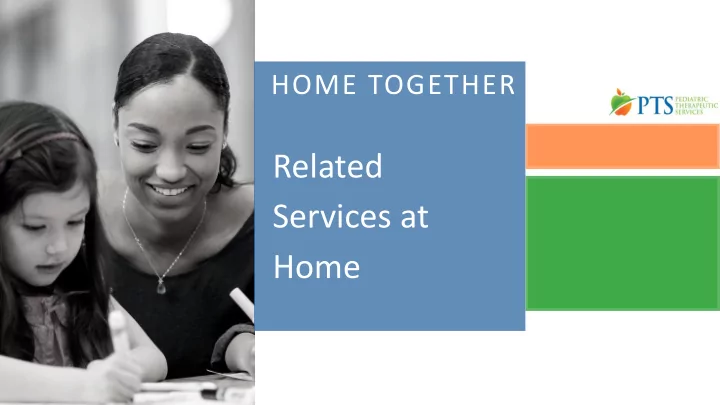

HOME TOGETHER Related Services at Home
Adapting the Role of Related Service Providers School Setting: • Support services to help the student access to the curriculum • Provide modifications or supports for school personnel • Facilitate progress toward student’s goals Home: • The SAME
R e l a t e d S e r v i c e s Data- Discuss how to Tools- equipment, Team- Collaboration collect data on your child’s strategies, activities, and consultation as a goals to make sure he or team to support your exercise programs, she is making meaningful child (and YOU) information,\ progress.
OBSTACLE OR OPPORTUNITY? • Time with your child’s therapist • Learn the “why” behind the strategies your therapist recommends • Find ways to carry over skill development and strategies into daily home routine • Problem solve together around challenges at home
WE ARE ALL ON THE SAME TEAM • You are the hands-on person for your child’s IEP team right now! • No one knows how to better motivate your child than you do, so teach your child’s team
Getting the Most from Your Sessions Review your child’s IEP goals for 1 each service type. Think about ways those skills can 2 be worked on at home. Plan ahead for sessions with your 3 therapist. Be honest about what’s working 4 and what isn’t.
Preparing for Sessions Front-end planning makes all the difference • Kn o w w h at go a l s /s k i l l s yo u ’ l l b e wo r k i n g o n • L e t yo u r t h e ra p i st k n o w w h at yo u h av e ava i l a b l e i n t h e h o m e to u s e a s a n a c t i v i t y • H av e a l l yo u r m ate r i a l s re a d y • G e t yo u r o t h e r c h i l d re n i n o n t h e f u n ! • G i v e fe e d b a c k to yo u r t h e ra p i st - w h a t ’s h a p p e n i n g t h e re st o f t h e w e e k !
IF THINGS AREN’T GOING WELL • Have an honest conversation with your child’s therapist first • Provide specific feedback: Timing, content, length of session • Participation issues? Ask for a consultation with a behavior specialist • Explore other options, such as asynchronous sessions • Reach out to the Special Education Supervisor for your child’s regular school building
CHANGE CAN BE GOOD … https://mypts.com/parents- and-teachers/
Recommend
More recommend